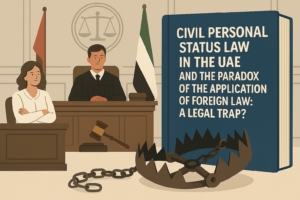Views
Civil Personal Status Law in the UAE and the Paradox of the Application of Foreign Law: A Legal Trap?

I. Introduction (*)
(*) For the sake of simplicity, reference will be made only to Federal Decree-Law No. 41/2022 of 2 October 2022 on Civil Personal Status. The Emirate of Abu Dhabi has enacted a separate law that addresses similar matters at the local level. For a comparison of the various applicable legal frameworks in family law in the UAE, see Béligh Elbalti, “The Personal Status Regimes in the UAE — What’s New and What Are the Implications for Private International Law? A Brief Critical Appraisal”.
There is no doubt that the introduction of the Civil Personal Status Law (CPSL) in the United Arab Emirates marks a significant turning point in the region’s legal landscape, particularly in areas traditionally governed by religious norms. The CPSL refers to the special law adopted at the federal level, which allows family law disputes involving non-Muslims (both foreigners and UAE citizens) to be resolved under a legal framework, that is intended to be modern, flexible, based on “rules of justice and fairness” and “the best international practices from comparative legal systems” (cf. article 19 of the Cabinet Resolution Concerning the Executive Regulation of Federal Decree-Law on the Civil Personal Status). However, the incorporation of the CPSL into the existing legal frameworks in the UAE has raised several issues. These include, among others, the articulation of the CPSL with the other applicable legal frameworks, and more importantly, the extent to which parties may opt out of this “modern” regime in favor of applying their own national laws (for a general overview, see Elbalti, op. cit.). Read more
Report on the ABLI/HCCH 4th Joint Webinar on “Cross-Border Commercial Dispute Resolution – Electronic Service of Documents and Remote Taking of Evidence“
by Achim Czubaiko-Güntgen, Research Fellow („Wissenschaftlicher Mitarbeiter“) and PhD Candidate, supported by the German Scholarship Foundation, Institute for German and International Civil Procedural Law, University of Bonn.
With the fourth instalment in their ongoing webinar series on “Cross-Border Commercial Dispute Resolution”, the Asian Business Law Institute (ABLI) and the Hague Conference on Private International Law (HCCH) returned to the topic of “Electronic Service of Documents and Remote Taking of Evidence”. Contrary to the first webinar in 2021, this session focussed not solely on the HCCH 1970 Evidence but equally on the HCCH 1965 Service Convention. Having finally overcome the immediate constraints of the Covid-19 pandemic, this time the renowned speakers were able to elaborate more on the long-term development and visions in the practice of the two legal instruments with regard to their respective areas of law.
The Nigerian Court of Appeal Upholds South African Choice of Court and Choice of Law Agreement
Case Citation:
Sqimnga (Nig.) Ltd v. Systems Applications Products (Nig.) Ltd [2025] 2 NWLR 423 (Court of Appeal, Lagos Division, Nigeria)
The dispute in this case arose between two Nigerian companies, Sqimnga Nigeria Ltd (the appellant) and Systems Applications Products Nigeria Ltd (the respondent). Both parties had entered into a Master Service Agreement in Nigeria, relating specifically to software solutions. A critical provision of this agreement stipulated that the laws of South Africa would govern any disputes, and further, that South African courts would possess exclusive jurisdiction to hear any matters arising from the agreement.
When a disagreement emerged between the parties, Sqimnga Nigeria Ltd initiated legal proceedings at the Lagos State High Court. The respondent immediately contested the jurisdiction of the Nigerian court, relying on the contractual clause mandating the use of South African law and courts. Read more
News
Call for Abstracts: Special Issue of the Italian-Spanish Journal of Procedural Law: “From Gavel to Grid: Reimagining Civil Justice in the Digital Era”
Gina Gioia, Jordi Nieva-Fenoll, and Seyedeh Sajedeh Salehi are inviting submissions for a Special Issue of the Italian-Spanish Journal of Procedural Law, which will be published under the title “From Gavel to Grid: Reimagining Civil Justice in the Digital Era”.
The details can be found in the attached Call for Papers.
Call for Abstracts: European Yearbook of International Economic Law 2026
We are happy to share the attached Call for Abstracts from the European Yearbook of International Economic Law for its 2026 volume, which will be dedicated on the “Reconstruction of International and European Economic Law”.
Abstracts can be submitted until 30 November 2025.
Virtual Early-Career Conference: ‘Global Harm, Local Justice | The Future of Cross-Border Torts’ (University of Groningen, 6 Feb 2026)
We are delighted to share the Call for Papers for a virtual early-career conference on ‘Global Harm, Local Justice | The Future of Cross-Border Torts’, hosted by K.C. (Kirsten) Henckel and M.A.S. (Martin) Bulla from the University of Groningen on 6 February 2026.
Abstracts of 300–500 words must be submitted by 1 December 2025.



